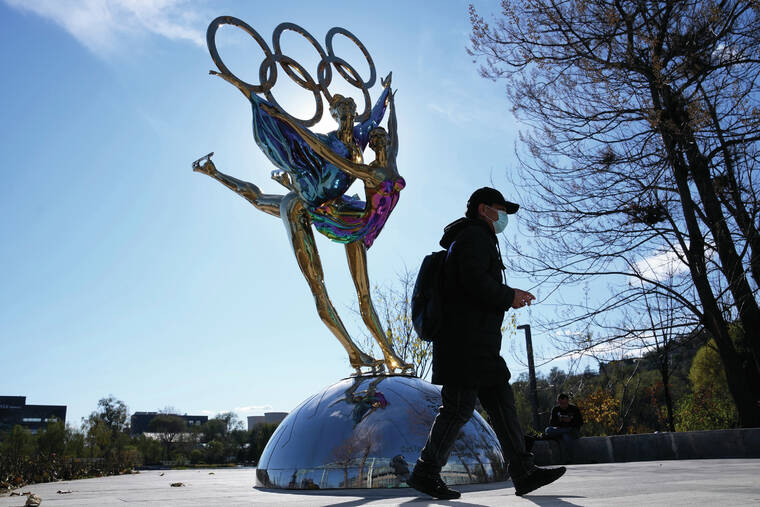U.S. uses a diplomatic boycott of the Olympics to rebuke China
WASHINGTON — The United States will not send government officials to the 2022 Winter Olympics in Beijing, a slap at China for human rights abuses.
The diplomatic boycott allows American athletes to compete, but it is seen as an affront and one of President Joe Biden’s most public condemnations of Beijing. China said it would respond with “resolute countermeasures.”
Pressure has been building for months from members of Congress in both parties to hold China accountable for abuses of Uyghur Muslims in the Xinjiang region and crackdowns on pro-democracy protests in Hong Kong. Those calls only intensified after the disappearance from public life of tennis star Peng Shuai after she accused a top Communist Party leader of sexual assault.
Jen Psaki, the White House press secretary, said the White House did not believe it was appropriate to send a delegation of U.S. officials to February’s Games in the wake of “genocide and crimes against humanity” in Xinjiang.
“We will not be contributing to the fanfare of The Games,” Psaki said.
Biden had raised the possibility of not sending the U.S. delegation after he held a virtual meeting last month with China’s leader, Xi Jinping.
That conversation was meant to cool boiling tensions between the world’s two largest powers. But Biden and Xi emerged with little more than pledges to improve cooperation after 3 1/2 hours of talks, despite a string of mutual disagreements.
The diplomatic boycott has been described by some critics of China in Congress as a way to hold Beijing accountable while not punishing American Olympians.
Sen. Bob Menendez, D-N.J., chair of the Senate Foreign Relations Committee, called the boycott “a powerful rebuke of the Chinese Communist Party’s campaign of genocide in Xinjiang.”
“This boycott is a necessary step to demonstrate our unwavering commitment to human rights in the face of the Chinese government’s unconscionable abuses,” Menendez said, adding that he hoped other nations would join the United States.
More hawkish members of Congress, including Sen. Tom Cotton, R-Ark., called the move a “half measure.”
“Bold leadership was required,” Cotton said. “The United States should fully boycott the genocide Games in Beijing.”
But previous attempts to pull athletes out of the Games have fallen flat. The last time the United States pursued a full boycott of the Olympics was in 1980, when President Jimmy Carter rallied against allowing athletes to participate in the Summer Games in Moscow to protest the Soviet Union’s military presence in Afghanistan.
While dozens of countries joined the United States in that action, most political leaders and sports officials in the decades since have argued that full boycotts only end up punishing athletes and providing talking points for host countries.
Last year, Sarah Hirshland, CEO of the U.S. Olympic and Paralympic Committee, wrote an open letter addressed to the athletes of the 1980 U.S. Olympic team, saying the boycott “had no impact on the global politics of the era and instead only harmed you.”
On Monday, Hirshland said, “We greatly appreciate the unwavering support of the president and his administration and we know they will be cheering us on from home this winter.”
Psaki sought to distance Biden’s boycott from the 1980 ban, saying the administration wanted to condemn the human rights abuses without punishing athletes.
“I don’t think we felt it was the right step to penalize athletes who have been training, preparing for this moment,” Psaki said.
Beijing has used the Olympic Games in the past to assert itself on the world stage, including in 2008 when the opening ceremony served as a way for the country to tout its economic rejuvenation. The international attention, however, did little to improve human rights in China. Biden has said rooting out such violations are a crucial piece of a national security strategy that is focused on competing with Beijing’s rising economic influence and coercive diplomacy.
René Provost, a professor of international law at McGill University, said diplomatic boycotts can help to “insert human rights into the conversation.”
The Olympics are a way for China to show it is “strong and central on the global stage,” Provost added. “So to put human rights as part of that picture does interfere with China’s messaging.”
Zhao Lijian of China’s Foreign Ministry said that the United States should “stop politicizing sports” and warned that “China will take resolute countermeasures,” but he gave no details about how China might retaliate for the move. He has noted that Russia’s president, Vladimir Putin, accepted an invitation from Xi to the Olympics.
It is not clear whether the United States’ boycott will pressure other countries to follow suit.
Secretary of State Antony Blinken said last month that the administration was discussing with allies how they planned to approach the Winter Games in Beijing, although he did not specify whether the United States had asked them to join a coordinated boycott. The administration has continued the informal discussions over the past several weeks, according to two European diplomats involved in the discussions.
One diplomat called it a pragmatic move that makes clear the Biden administration’s displeasure with Beijing’s policies, but did not amount to a full snub in order to leave room for the delicate and ongoing talks between the United States and China. It was not clear, however, whether European governments would also refuse to send official delegations to the Games, and both diplomats said no decisions had yet been made.


